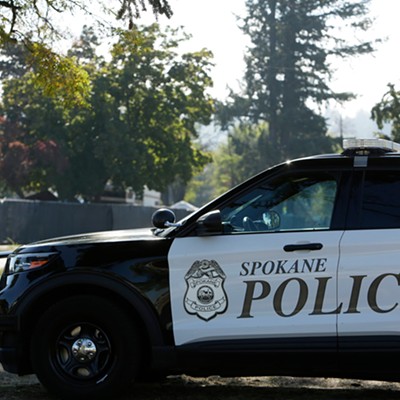Power to the People
[
{
"name": "Broadstreet - Instory",
"insertPoint": "5",
"component": "25846487",
"requiredCountToDisplay": "5"
},{
"name": "Broadstreet - Instory",
"insertPoint": "10",
"component": "25846487",
"requiredCountToDisplay": "10"
},{
"name": "Broadstreet - Instory",
"insertPoint": "15",
"component": "25846487",
"requiredCountToDisplay": "15"
},{
"name": "Broadstreet - Instory",
"insertPoint": "20",
"component": "25846487",
"requiredCountToDisplay": "20"
}
]
by The Inlander & r & & r &
Washington Initiative 920
Repealing the Estate Tax
4 No
& lt;span class= "dropcap " & T & lt;/span & his is one gutsy initiative. Usually the business of repealing estate taxes is done at the legislative level, with lobbyists twisting arms out of the public's glare -- as has been the case with the fight over the misnamed "death tax" back in Washington, D.C. To take a tax break for the super-rich to a popular vote is almost laughable -- but for the financiers of the effort, it's a gamble that, if successful, would have a hug payoff. After all, I-920 would repeal estate taxes on estates worth $2 million or more.
A lot of people might think they'll die with a $2 million estate, but the reality is only about 250 estates (including about 15 businesses) fit that description every year in Washington state. The cost of I-920, which would impact education most, would be around $100 million per year.
Ironically, many of these multimillionaires would never have been so successful had they not lived in a state that educated them in the first place. This is how they repay that debt? Even after taxes, these people's heirs will still be rich; they should consider estate taxes a small price to pay for their parents' success.
Washington Initiative 933 and Idaho Proposition Two
Property rights
4 No
& lt;span class= "dropcap " & E & lt;/span & ver heard of a wolf in sheep's clothing? Remember the Supreme Court case a few years ago that allowed a city in Connecticut to take some land under eminent domain? The outrage that "Kelo Decision" spawned is the sheep's clothing hiding the truth about Initiative 933 in Washington and Proposition Two in Idaho -- which are essentially the same.
These initiatives, as has been learned in Oregon and Colorado, are really about eliminating all state and local oversight over land use. If a landowner feels he is not able to use his land in the way he wants because of legal regulations, they city, county or state government is forced to choose whether to pay that landowner the lost value or simply rescind the rules and let him proceed.
As has been discovered in Colorado (where the initiative has already been repealed) and Oregon, governments can't afford to pay, so laws are invalidated. Apartments can go up in single-family neighborhoods, junkyards next to parks; in fact, the government could find itself having to pay a landowner to stop polluting the groundwater.
The outrage over the government "taking" property is a powerful force, and it got Measure 37 passed in Oregon. Today, it's costing that state $350 million a year and is challenging the state's land use laws, which had been among the most progressive in the nation and turned that state into one of the most desirable places to live in the United States. In Washington state, the Office of Financial Management has calculated the cost of I-933 over the next six years to be somewhere between $5 billion and $7 billion. That counts what it would cost all levels of government. Guess what? That means you, Joe Taxpayer, would get the bill.
These initiatives have sprung up all over the nation, wherever initiatives are allowed, and they have been paid for by one Howard Rich, a New York real estate developer who has spent some $11 million figuring out how to run states he doesn't even live in. In Montana this election cycle, there were three initiatives on the ballot; only recently did state newspapers figure out that all three were funded by Rich. They have all (including a similar "takings" initiative) since been declared unconstitutional in advance of the November election.
I-933 and Prop. Two are the worst kinds of abuse of the initiative system. All the efforts of local people to determine a common way of life, via planning and legislation, would be blown up by out-of-state money and disingenuous, manipulative ad campaigns. (Idaho, it's worth mentioning, has already specifically addressed eminent domain issues after the Kelo Decision.)
Measured by sheer potential economic impact, I-933 and Prop. Two appear to be the most important initiatives local voters have ever had to judge. And that makes them the most dangerous.
Washington Initiative 937
Alternative energy
No
& lt;span class= "dropcap " & E & lt;/span & verybody is for cleaner, renewable energy, which makes I-937 this year's feel-good initiative. But the devil is in the details. First created to reform states that rely too heavily on coal-powered electrical plants, this legislation suffers from a one-size-fits-all flaw. Washington is different. There are very few coal-powered plants here, and unlike many states, there is lots of hydropower. Now hydropower has its downside -- just ask the rapidly disappearing salmon runs. But that's a different issue.
What voters must consider here is why hydropower counts as a fine alternative to coal in other states but would not be counted that way here with I-937? Because, it seems, if hydro is considered renewable, Washington doesn't have a problem.
Proponents of 937 talk about biomass, solar and even tidal power plants, but don't be fooled -- this is all about wind power. There's nothing wrong with wind power, and in fact many utilities are already adding it to their portfolios. But at present it only survives on subsidies; forcing utilities to add more wind power will only create expenses that, as we all know, utilities companies like to pass on to consumers. For economic competitiveness, Spokane and the Inland Northwest need to maintain what advantages they still have in the cost of electricity; I-937 will undermine that.
But we have to do something. I-937 does nothing to address the one thing that does impact our air quality and dependence on foreign oil: the gas-powered car. Washington has done some good things on auto emission standards, but if people want to make a change, then encourage your elected officials to follow California's aggressive lead in pushing auto manufacturers to make more efficient, cleaner-running cars and trucks.
Idaho Proposition One
Sales tax increase for education
YES
& lt;span class= "dropcap " & T & lt;/span & his one's pretty simple: If you think it's acceptable to have Idaho's education system mentioned in the same sentence as Louisiana and Mississippi, there's no need to make a change. If, however, you want a brighter economic future for Idaho, you might want to consider supporting what was once unthinkable in Idaho -- a penny tax increase on every dollar in retail sales.
If you worry this will just be more money for a system lacking accountability, you should know the money will be targeted to areas of documented need -- textbooks that reflect that we have, in fact, landed on the moon, and keeping teachers who can find better-paying jobs in other states. Additionally, local districts will have control over how to deploy the funds, within those documented areas of need.
Unlike Proposition Two, Prop. One is exactly the kind of issue the initiative system should be used to settle. For years, the Idaho legislature has underfunded schools, and local districts haven't fared much better in their own funding mechanisms. Clearly it's time to take the issue directly to the people. Now we'll see how far Idaho has come in realizing that education is its economic foundation.
The Inlander offers opinions
on many but not all elective races and ballot measures.
Pick up next week's issue for more endorsements.
Washington Initiative 920
Repealing the Estate Tax
4 No
& lt;span class= "dropcap " & T & lt;/span & his is one gutsy initiative. Usually the business of repealing estate taxes is done at the legislative level, with lobbyists twisting arms out of the public's glare -- as has been the case with the fight over the misnamed "death tax" back in Washington, D.C. To take a tax break for the super-rich to a popular vote is almost laughable -- but for the financiers of the effort, it's a gamble that, if successful, would have a hug payoff. After all, I-920 would repeal estate taxes on estates worth $2 million or more.
A lot of people might think they'll die with a $2 million estate, but the reality is only about 250 estates (including about 15 businesses) fit that description every year in Washington state. The cost of I-920, which would impact education most, would be around $100 million per year.
Ironically, many of these multimillionaires would never have been so successful had they not lived in a state that educated them in the first place. This is how they repay that debt? Even after taxes, these people's heirs will still be rich; they should consider estate taxes a small price to pay for their parents' success.
Washington Initiative 933 and Idaho Proposition Two
Property rights
4 No
& lt;span class= "dropcap " & E & lt;/span & ver heard of a wolf in sheep's clothing? Remember the Supreme Court case a few years ago that allowed a city in Connecticut to take some land under eminent domain? The outrage that "Kelo Decision" spawned is the sheep's clothing hiding the truth about Initiative 933 in Washington and Proposition Two in Idaho -- which are essentially the same.
These initiatives, as has been learned in Oregon and Colorado, are really about eliminating all state and local oversight over land use. If a landowner feels he is not able to use his land in the way he wants because of legal regulations, they city, county or state government is forced to choose whether to pay that landowner the lost value or simply rescind the rules and let him proceed.
As has been discovered in Colorado (where the initiative has already been repealed) and Oregon, governments can't afford to pay, so laws are invalidated. Apartments can go up in single-family neighborhoods, junkyards next to parks; in fact, the government could find itself having to pay a landowner to stop polluting the groundwater.
The outrage over the government "taking" property is a powerful force, and it got Measure 37 passed in Oregon. Today, it's costing that state $350 million a year and is challenging the state's land use laws, which had been among the most progressive in the nation and turned that state into one of the most desirable places to live in the United States. In Washington state, the Office of Financial Management has calculated the cost of I-933 over the next six years to be somewhere between $5 billion and $7 billion. That counts what it would cost all levels of government. Guess what? That means you, Joe Taxpayer, would get the bill.
These initiatives have sprung up all over the nation, wherever initiatives are allowed, and they have been paid for by one Howard Rich, a New York real estate developer who has spent some $11 million figuring out how to run states he doesn't even live in. In Montana this election cycle, there were three initiatives on the ballot; only recently did state newspapers figure out that all three were funded by Rich. They have all (including a similar "takings" initiative) since been declared unconstitutional in advance of the November election.
I-933 and Prop. Two are the worst kinds of abuse of the initiative system. All the efforts of local people to determine a common way of life, via planning and legislation, would be blown up by out-of-state money and disingenuous, manipulative ad campaigns. (Idaho, it's worth mentioning, has already specifically addressed eminent domain issues after the Kelo Decision.)
Measured by sheer potential economic impact, I-933 and Prop. Two appear to be the most important initiatives local voters have ever had to judge. And that makes them the most dangerous.
Washington Initiative 937
Alternative energy
No
& lt;span class= "dropcap " & E & lt;/span & verybody is for cleaner, renewable energy, which makes I-937 this year's feel-good initiative. But the devil is in the details. First created to reform states that rely too heavily on coal-powered electrical plants, this legislation suffers from a one-size-fits-all flaw. Washington is different. There are very few coal-powered plants here, and unlike many states, there is lots of hydropower. Now hydropower has its downside -- just ask the rapidly disappearing salmon runs. But that's a different issue.
What voters must consider here is why hydropower counts as a fine alternative to coal in other states but would not be counted that way here with I-937? Because, it seems, if hydro is considered renewable, Washington doesn't have a problem.
Proponents of 937 talk about biomass, solar and even tidal power plants, but don't be fooled -- this is all about wind power. There's nothing wrong with wind power, and in fact many utilities are already adding it to their portfolios. But at present it only survives on subsidies; forcing utilities to add more wind power will only create expenses that, as we all know, utilities companies like to pass on to consumers. For economic competitiveness, Spokane and the Inland Northwest need to maintain what advantages they still have in the cost of electricity; I-937 will undermine that.
But we have to do something. I-937 does nothing to address the one thing that does impact our air quality and dependence on foreign oil: the gas-powered car. Washington has done some good things on auto emission standards, but if people want to make a change, then encourage your elected officials to follow California's aggressive lead in pushing auto manufacturers to make more efficient, cleaner-running cars and trucks.
Idaho Proposition One
Sales tax increase for education
YES
& lt;span class= "dropcap " & T & lt;/span & his one's pretty simple: If you think it's acceptable to have Idaho's education system mentioned in the same sentence as Louisiana and Mississippi, there's no need to make a change. If, however, you want a brighter economic future for Idaho, you might want to consider supporting what was once unthinkable in Idaho -- a penny tax increase on every dollar in retail sales.
If you worry this will just be more money for a system lacking accountability, you should know the money will be targeted to areas of documented need -- textbooks that reflect that we have, in fact, landed on the moon, and keeping teachers who can find better-paying jobs in other states. Additionally, local districts will have control over how to deploy the funds, within those documented areas of need.
Unlike Proposition Two, Prop. One is exactly the kind of issue the initiative system should be used to settle. For years, the Idaho legislature has underfunded schools, and local districts haven't fared much better in their own funding mechanisms. Clearly it's time to take the issue directly to the people. Now we'll see how far Idaho has come in realizing that education is its economic foundation.
The Inlander offers opinions
on many but not all elective races and ballot measures.
Pick up next week's issue for more endorsements.



















